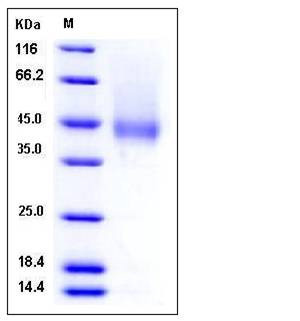Rhesus CD16 / FCGR3 Protein (His & AVI Tag), Biotinylated
FCGR3, CD16
- 100ug (NPP2895) Please inquiry
| Catalog Number | P90013-C27H-B |
|---|---|
| Organism Species | Rhesus |
| Host | Human Cells |
| Synonyms | FCGR3, CD16 |
| Molecular Weight | The recombinant rhesus CD16 consists of 223 amino acids and has a calculated molecular mass of 25.3 kDa. |
| predicted N | Gly 17 |
| SDS-PAGE |  |
| Purity | > 92 % as determined by SDS-PAGE |
| Protein Construction | A DNA sequence encoding the rhesus CD16 (NP_001258584.1) extracellular domain (Met 1- Gln 208) was fused with a c-terminal polyhistidine tagged AVI tag at the C-terminus. The expressed protein was biotinylated in vivo by the Biotin–Protein ligase (BirA enzyme) which is co-expressed. |
| Bio-activity | 1. Measured by its ability to bind human IgG1 in a functional ELISA. 2. Labeling ratio of biotin to protein: 0.4 |
| Research Area | Signaling |Signal Transduction |ITIM/ITAM Immunoreceptors and Related Molecules |
| Formulation | Lyophilized from sterile PBS, pH 7.4 1. Normally 5 % - 8 % trehalose and mannitol are added as protectants before lyophilization. Specific concentrations are included in the hardcopy of COA. |
| Background | Fc receptors bind the most common class of antibody, IgG, are called Fc gamma receptors (FcγR). FcγR is divided into three classes, Fc γ RI (CD64), Fc γ RII (CD32), and Fc γ RIII (CD16). CD16 protein is a multifunctional, low/intermediate affinity receptor, which belongs to the immunoglobulin superfamily. It is found on the surface of natural killer cells, neutrophil polymorphonuclear leukocytes, monocytes and macrophages. Mouse CD16 is encoded by a single gene, while, human CD16 is expressed as two distinct forms (CD16a/FcγRIIIa and CD16b/FcγRIIIb) encoded by two different highly homologous genes in a cell type-specific manner. CD16 is involved in phagocytosis, secretion of enzymes, inflammatory mediators, antibody-dependent cellular cytotoxicity (ADCC), and clearance of immune complexes. |
| Reference |
